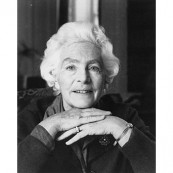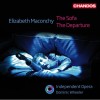Composers
Dame Elizabeth Violet Maconchy LeFanu DBE (/məˈkɒŋkiː ˈlɛfænuː/; 19 March 1907 – 11 November 1994) was an Irish-English composer.
Elizabeth Violet Maconchy was born in Broxbourne, Hertfordshire, of Irish parents, and grew up in England and Ireland.[4] Her family moved to Ireland in 1917, where they lived in Howth, on the east coast. The adolescent Maconchy began her musical studies in Dublin, studying piano with Edith Boxhill, and harmony and counterpoint with Dr John Larchet.[5] Those formative years in Ireland where important for Maconchy, who considered herself Irish.[6] Throughout her career she was identified as an Irish composer, or as an English composer with 'Celtic' influences, by reviewers and commentators.[7]
In 1923, at the age of sixteen, she moved to London to enrol at the Royal College of Music. At the RCM Maconchy studied under Charles Wood and Ralph Vaughan Williams.[4][8] Her contemporaries at the college included Grace Williams, Dorothy Gow, and Ina Boyle. Early compositions such as the violin sonata and Piano Concertino of 1927 already show the influence of European composers, especially Bartok.[9] As a student, Maconchy was awarded the Blumenthal Scholarship in 1927, and the Octavia Scholarship of 1930, which allowed her to continue her studies in Prague. Her first public recognition came in 19 March 1930 with a performance of her Piano Concerto, conducted by her teacher there, Karel Jirak.[10] This was followed on 30 August by a BBC Proms performance of her cantata The Land, conducted by Henry Wood,[11] which was inspired by the long poem of the same name by Vita Sackville-West.
In response to the scarce opportunities for young avant garde composers and for female composers, a group women got together to organise regular concerts at the small Ballet Club theatre in Notting Hill, London, showcasing new work. It has been claimed that this venture "changed the face of music in London", and that it "prove[d] a lifeline for Elizabeth Maconchy through the 1930s".[12]
In 1930 Maconchy married William LeFanu, with whom she had two daughters:[3][8] Elizabeth Anna LeFanu (born 1939) and Nicola LeFanu (born 1947).[1] In 1932, Maconchy developed tuberculosis and she moved with her family from London to Kent.[1][4] She returned to Ireland in 1939, living in Dublin for a brief period, during which she composed her Fifth String Quartet, which some critics consider her greatest achievement,[13] and gave birth to a daughter.
Maconchy did much to improve the conditions of composers, being elected Chair of the Composers Guild of Great Britain in 1959, a position she held for a number of years. She was also President of the Society for the Promotion of New Music. Maconchy was a socialist, and her activism extended to supporting the Democratic/Republican side in the Spanish Civil War, and other causes.[14]
Maconchy's friends included the English composer Elisabeth Lutyens, Welsh composer Grace Williams, the Irish composer Ina Boyle, and the Czech music critic Jan Löwenbach [cs; de].
Maconchy once declared that: "for me, the best music is an impassioned argument"
| Country: | United Kingdom |
| Period: | XX age |
Biography
Dame Elizabeth Violet Maconchy LeFanu DBE (/məˈkɒŋkiː ˈlɛfænuː/; 19 March 1907 – 11 November 1994) was an Irish-English composer.
Elizabeth Violet Maconchy was born in Broxbourne, Hertfordshire, of Irish parents, and grew up in England and Ireland.[4] Her family moved to Ireland in 1917, where they lived in Howth, on the east coast. The adolescent Maconchy began her musical studies in Dublin, studying piano with Edith Boxhill, and harmony and counterpoint with Dr John Larchet.[5] Those formative years in Ireland where important for Maconchy, who considered herself Irish.[6] Throughout her career she was identified as an Irish composer, or as an English composer with 'Celtic' influences, by reviewers and commentators.[7]
In 1923, at the age of sixteen, she moved to London to enrol at the Royal College of Music. At the RCM Maconchy studied under Charles Wood and Ralph Vaughan Williams.[4][8] Her contemporaries at the college included Grace Williams, Dorothy Gow, and Ina Boyle. Early compositions such as the violin sonata and Piano Concertino of 1927 already show the influence of European composers, especially Bartok.[9] As a student, Maconchy was awarded the Blumenthal Scholarship in 1927, and the Octavia Scholarship of 1930, which allowed her to continue her studies in Prague. Her first public recognition came in 19 March 1930 with a performance of her Piano Concerto, conducted by her teacher there, Karel Jirak.[10] This was followed on 30 August by a BBC Proms performance of her cantata The Land, conducted by Henry Wood,[11] which was inspired by the long poem of the same name by Vita Sackville-West.
In response to the scarce opportunities for young avant garde composers and for female composers, a group women got together to organise regular concerts at the small Ballet Club theatre in Notting Hill, London, showcasing new work. It has been claimed that this venture "changed the face of music in London", and that it "prove[d] a lifeline for Elizabeth Maconchy through the 1930s".[12]
In 1930 Maconchy married William LeFanu, with whom she had two daughters:[3][8] Elizabeth Anna LeFanu (born 1939) and Nicola LeFanu (born 1947).[1] In 1932, Maconchy developed tuberculosis and she moved with her family from London to Kent.[1][4] She returned to Ireland in 1939, living in Dublin for a brief period, during which she composed her Fifth String Quartet, which some critics consider her greatest achievement,[13] and gave birth to a daughter.
Maconchy did much to improve the conditions of composers, being elected Chair of the Composers Guild of Great Britain in 1959, a position she held for a number of years. She was also President of the Society for the Promotion of New Music. Maconchy was a socialist, and her activism extended to supporting the Democratic/Republican side in the Spanish Civil War, and other causes.[14]
Maconchy's friends included the English composer Elisabeth Lutyens, Welsh composer Grace Williams, the Irish composer Ina Boyle, and the Czech music critic Jan Löwenbach [cs; de].
Maconchy once declared that: "for me, the best music is an impassioned argument"



